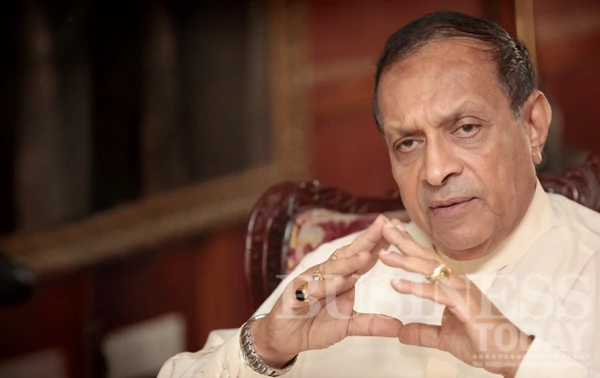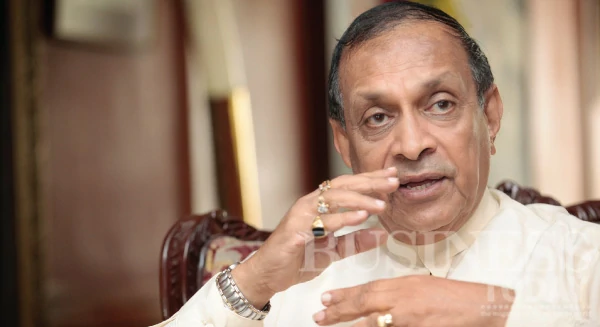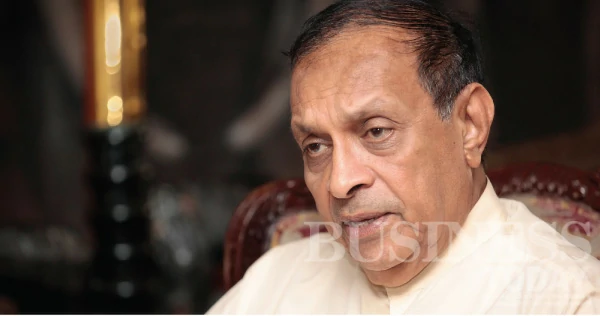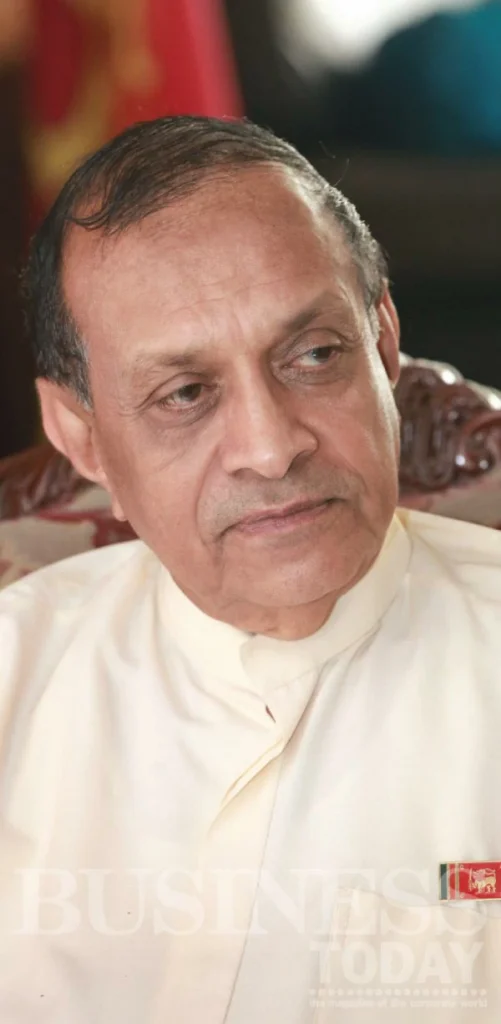
The United National Party (UNP) has recognised that in order for it to regain its strength as the single most powerful party in the country, it needs to unite as it has done so in the past. The Leadership Council is the mechanism brought forward to address the issues facing the UNP. At its helm as Chairman is Karu Jayasuriya MP who has held numerous posts within the party. He speaks of the strengths of the UNP, which had ensured democracy, good governance and the rule of law in the country, where there was proper management and professionalism in all spheres. As a party that has its roots as far back as 1946, Sri Lanka cannot merely disregard the experience that the UNP encompasses within its fold. In a day and age where unity is important, to go forward should we not unite?
Words Udeshi Amarasinghe
Photographs Menaka Aravinda and Mahesh Bandara
As the Chairman of the Leadership Council of the United National Party, can you tell us the significance of this Council and the work done so far?
The Leadership Council came into being as there was a certain amount of disunity and disharmony within the United National Party that had been prevalent for a very long time. This was a concern to the people of this country as well as all religious leaders including the Mahanayakas. Furthermore civil society demanded that the United National Party should work together to be a strong opposition simply because there is a growing concern about the way the government is conducting its affairs.
The religious leaders came forward with a proposal that stipulated the formation of a Leadership Council, which would share the responsibilities of the party. The national leader of the UNP agreed that the time had come for him to take on a new approach and he transferred a significant amount of power to this Council.
Of course we had to start from the very beginning as we had disunity in many quarters where members including professionals, ex-MPs and even the clergy were divided into various camps.
With this proposal it was possible for us to bring all of them together.
I am extremely happy to say that the clergy are speaking with one voice and about 60 ex-MPs are back with us again. In fact these ex-MPs will be utilised in the selection of applicants for the provincial council elections. Furthermore we will be able to use them to visit the electorates and report to us about the performance of the organisers. This is already being done. We are having constructive dialogue with professionals and retired civil servants who assist us with the first phase of the selection process of candidates. Then the Leadership Council has implemented a mechanism to rebuild the party’s relationship with grass root level organisations, which have to be strengthened. I must say that we
are looking at the future very confidently. When we speak to the UNPers they have hope and they are happy that the party has started moving in the right direction.
They know that this is a sincere and genuine effort on the part of the UNP.
The Leadership Council Came Into Being As There Was A Certain Amount Of Disunity And Disharmony Within The United National Party That Had Been Prevalent For A Very Long Time… We Are Very Happy That There Is Now Unity Within The Party To A Great Extent.
We had a religious ceremony in Anuradhapura recently where over 700 Buddhist monks and more than 15,000 people participated in the programme. This was a very good start. Subsequently we did a survey of 250 participants and found that 72 percent had attended because they saw a positive development for the future, while the remaining 28 percent attended for religious reasons. There is unity in the party and the UNP is becoming stronger. The journey ahead will be tough because we have been given a very challenging assignment, but I am very proud of my team. Two members did not join the Council even though we tried our best to urge them to be a part of the team, however we are moving ahead and work is progressing.
The seven of us in the Council may have different views, but as
the Chairman I respect what they have to say, and then we reach a consensus. In this manner we
work really well because there is teamwork and professionalism.
The country as well as the party needs professionalism. The people have not forgotten the work done by the UNP in the past. They always talk of the UNP as the party that secured Independence for
Sri Lanka and the party that brought all races and religions together. It is their opinion that it is the responsibility of the UNP to build unity within the country. They look at the UNP for professional governance.
2014 is going to be a very challenging year but we are ready
to overcome any obstacles.
The Leadership Council may not be
100 percent successful but we
have journeyed forward, and we have a long way to go. We are very happy that there is now unity within the party to a great extent.
Will the Leadership Council be able to address all the issues faced by the UNP?
I do not consider the Leadership Council as Aladdin’s wonderful lamp. But we have to go step by step.
So far from the contribution made by my colleagues and myself where we have devoted a lot of energy and time to find solutions, the outcome has been very positive. Many of our discussions have been held behind closed doors where the media was not allowed. People do not know about the work that we have done.
I am confident as time goes on that the plans that are afoot will put us in a position to face the enormous challenges ahead.
The Western and Southern provincial council elections will be held in March. How will the UNP fair in this election?
We are of course working towards victory. However, there must be free and fair elections in this country, which has not been the case during the past few years. With the abolishment of the 17th Amendment we have seen that all elections have been held to the advantage of the government.
The 17th Amendment came into being after the famous Wayamba elections. That was one of the most notorious elections held in this country. I still remember during the Wayamba elections there were killings, harassments, burning of houses, assaulting of people and there were instances where people were even stripped. The entire civil society called for action. The Bishop of Chilaw, who was a very strong critic of the incident, worked with us and together we formed a movement. I was the Mayor of Colombo at that time and I was invited to chair the meeting of the Citizens Committee that was established to draw the plan of action. We first drew up a proposal that stipulated the mechanism to control executive powers. We saw that the presidential powers were too much for an individual to hold. The Sri Lankan President is one of the most powerful presidents in the world.
We started in 1999 and by 2001 when we finalised the draft Amendment, the JVP had agreed to support the Chandrika Kumaratunga government, and the implementation of the Amendment was one of the conditions for cohabition. I must give credit to the JVP because it was during their interim government that they pushed the 17th Amendment through. I must also compliment the former President Chandrika Kumaratunga for having agreed to do the 17th Amendment as her powers were to be controlled and reduced. This continued till 2005, however President Mahinda Rajapaksa was never a fan of the 17th Amendment. He always felt that the 17th Amendment took away the powers
of the executive.
We Are Of Course Working Towards Victory. However, There Must Be Free And Fair Elections In This Country… With The Abolishment Of The 17th Amendment We Have Seen That All Elections Have Been Held To The Advantage Of The Government.
The Constitutional Council consisted of the Speaker, Prime Minister, Leader of the Opposition and five other eminent persons. Initially we had a problem selecting the five eminent persons as Tamils of Northern origin, Tamils of Indian origin, Muslims, small parties and the President wanted representation. We had a tremendous task in selecting the five eminent members, but we were finally able to do so. Although they represented sectoral interests, at the end of the day they were eminent people. Therefore the 17th Amendment was a beautiful piece of work. The public service, judiciary and police were able to work without the interference of the government. I remember even the decisions made by President Kumaratunga were reversed by the Public Services Commission. Unfortunately in 2005 President Rajapaksa did not want to continue with the 17th Amendment and it was allowed to die. The 18th Amendment that was introduced subsequently gave excessive powers to the executive.
The 17th Amendment was vital for good governance. It was an excellent legislation that controlled the executive because there is a large amount of power vested in the head of state. As a person who played an active part in introducing the 17th Amendment, it is indeed sad to see the indiscipline in the police, judiciary and the public service. Promotions and positions have been given to those who do not actually have the qualifications nor the experience to hold such positions. Many are political appointees. This is very unfortunate for this country. It has become a political administration.
We still believe that the 17th Amendment is a must and the Lessons Learnt and Reconciliation Commission (LLRC) has also highlighted the same. We do not believe that the Election Commissioner can act independently as he is appointed by the President and as such is not independent. It is the same with the Attorney General. These are not good signs for any country. At least now that the President is the Chairman of the Commonwealth we should follow Commonwealth values.
The state media as well as other media are controlled. Then the entire government machinery is used for political purposes, during election time. Usually once the nominations are received by the election commissioner, he sends the guidelines to all the ministries and their secretaries, stipulating that government property cannot be used for elections. We are totally against the use of the
President’s house and the Governor’s house to entertain people for election purposes. Then, during election time goods are distributed to the people. During the Northern elections many items were distributed, but though the people accepted these they were wise enough not to vote for the government. If the government holds free and fair elections where the people are allowed to vote without any interference, they will show their worth.
We ought to have an independent election commission chaired by an independent council. We do not accept the present appointments. The people in this country are beginning to tire of the way the government is conducting its business. There is an overwhelming amount of corruption. We hope that the government will realise the importance of addressing these issues, considering the international pressure the country is facing, and the President being the Chairman of the Commonwealth that a new model of governance needs to be introduced. That is our wish and we still believe that the recommendation of the LLRC should be implemented quickly without taking too long as it will be for the betterment of the country.
What can you tell us about the candidates who are contesting this time?
We are in the process of selecting the candidates because we are keen to see that all the candidates that are selected are people who can be called honourable members. Politics has deteriorated to such an extent that we have many unsavoury persons contesting elections. As such we are extremely careful in selecting the candidates contesting under the elephant symbol. It is not an easy task.
Today it is a common feature to see those who have gained popularity in other fields such as actors, musicians and sports personalities entering politics. Whether they can contribute to the development of the country is difficult to say. The UNP too has received applications from a few actors. They will go through the selection process and then they will have to face the preliminary interview board. Then we have a district interview board, and finally they will have to face the nomination board, which is chaired by me. As in all aspects in the selection of candidates we seek the advice of the national leader as well. It is a team effort because we are part of a team.
We Are In The Process Of Selecting The Candidates Because We Are Keen To See That All The Candidates That Are Selected Are People Who Can Be Called Honourable Members… As In All Aspects In The Selection Of Candidates We Seek The Advice And Consent Of The National Leader. It Is A Team Effort Because We Are Part Of A Team.
Can you briefly describe your political history? Having held various posts in the UNP, in your opinion is the once strong UNP losing its power?
No, the UNP is not losing its power. On the contrary people are looking at the UNP as a party that can save the country from disaster.
I entered active politics in 1995.
I was a diplomat for a few years, but before that I was in the private sector for more than 32 years. Of course though I never wanted to be a politician, I started working behind the scenes in the 1970s with President J R Jayewardene. It was President R Premadasa who entrusted me with a number of responsibilities. As a member of the Presidential Commission and Chairman, I successfully concluded the first privatisation of an enterprise-United Motors-for President Premadasa. It was during the height of the 1989 insurgency. We needed support from the IMF who agreed to a loan on the condition that a state entity should be privatised. The institution was selected, which was United Motors that came under the purview of the Ministry of Industries, which was headed by Ranil Wickremesinghe.
Then in 1992, President Premadasa wanted me to organise Sri Lanka’s first ever international trade fair-Expo 1992. He wanted more than 1,000 visitors to attend but in actual fact we had more than 5,600 visitors. It was a tremendous success and soon after that he sent me to Germany with accreditation to Austria and Switzerland as the Ambassador.
Upon my return in 1994, I was invited to join active politics by the Party Leader, but I said that I will work behind the scenes. With the resignation of Mr A C S Hameed,
I was appointed as the UNP Chairman unanimously. It was then that I slowly came into full time politics. In 1997 I was invited to be the UNP Mayoral candidate for the Colombo Municipal Council elections. I reluctantly consented on the strictest understanding that the assignment should be a short one. During this period the city of Colombo underwent a dramatic change and it was recognised as the cleanest city in the SAARC region and one of the best managed cities in Asia and the Colombo Mayor was honoured as the most innovative Mayor in the region.
In 1999, I contested the Western provincial elections where I was elected as the Opposition Leader of the Western provincial council. Here again I held the post for a very short term since I had to enter Parliament at the next election.
During This Period The City Of Colombo Underwent A Dramatic Change And It Was Recognised As The Cleanest City In The SAARC Region And One Of The Best Managed Cities In Asia And The Colombo Mayor Was Honoured As The Most Innovative Mayor In The Region.
During the current regime we saw a rapid deterioration in democratic values, good governance and the rule of law. The state media was used to destory the image of political parties and their leaders to an unprecedented level. Those who advocate for democracy, human rights, press freedom etc, are labelled as LTTE sympathisers. Although the government implicated the UNP too in the same category, people know that from the acting leader, after the death of Prabakaran, deputy leader, commanders of units and senior cadres of the LTTE hold senior positions in the government.
Looking at the present situation, despite the many ups and downs the time for the UNP is coming. We want unity within the party. My task and the task of the Leadership Council is to bring all fractions together. Many people left us due to various issues, we have asked them to come back and the majority have.
But I must also stress that for any political party discipline is a must to go forward. We must therefore maintain discipline at all levels.
What are your thoughts on the current opposition? Is it sufficient?
The government has very cleverly divided the opposition as well as the opposition parties. But I always believe that if we are to make a regime change then the people should have a strong combined opposition. Despite the fact that we have ideological differences we see a trend where political parties are coming together with a common agenda such as the abolishment of the executive presidency, restoring the 17th Amendment, press freedom and rule of law. We saw such an attempt at the recently held joint opposition rally in Hyde Park.
What is the UNPs stance in relation to issues that the country is facing internationally?
The United National Party always maintained friendly relationships with all countries and we had a very professional diplomatic service. Look at the position now; there are 28 political appointments as head of overseas missions and consulates and a further 43 appointments in various other positions. How can a country have a professional diplomatic service in this environment?
The Foreign Ministry is as important as the Finance Ministry to a country. In most European countries after the Prime Minister, the Foreign Minister is the most powerful person.
During the UNP regimes more than 60 percent of the postings were given to career diplomats while the remaining 40 percent were assigned to professionals and people of repute.
But you served as an Ambassador as well?
At the time I was appointed as the Ambassador to Germany, I could not be considered as a political appointment because I came from the private sector with 32 years of experience and I served as the Chairman of the National Chamber of Commerce, Deputy President of the Federation of Commerce and Industry and the President of the SAARC Chamber. President Premadasa wanted to look at Germany as a model for Sri Lanka. Today not only are appointments given arbitrarily to friends and relations, they are kept for more than the stipulated three years.
There is no professionalism in the diplomatic service of Sri Lanka today.
In USA for example they have hired PR companies to promote Sri Lanka. This type of public relations has to be done by our own diplomats. During Prime Minister Ranil Wickremesinghe’s government, we were able to secure 4.2 billion dollars for development because they saw good governance, transparency, planning and that we were using the funds for the correct purpose. Today, look at the way the government is taking loans for various projects. Large projects are commissioned without proper studies but purely for political purposes. There is no transparency in the award of tenders. We used to secure loans with one percent or two percent interest, but now it is more than seven percent. Who is paying this? It is the people of this country.
What are your thoughts on the economy of the country?
The amount of money taken by this government is three times the money that was taken by all governments since Independence. This clearly shows that something is wrong somewhere. We are not against highways, ports or building bridges but see the cost. Some of the highways and roads that we are building are heavily overpriced. It is a fact that the most expensive roads are in Sri Lanka. The government must look into this because we cannot keep our eyes closed and allow the money to be wasted like this. Someone has to answer because the money spent belongs to the people of this country.
My Wish And Prayer Is To See The People Of This Country Enjoying Democratic Freedom, Good Governance And Prosperity.
For the country to prosper there should be good management of the economy. There is no proper planning, no feasibility studies, and the right people are not in the right place. If we look at for example the operations of the Ceylon Petroleum Corporation during the UNP regime, when we took over the Corporation was suffering massive losses. In the first year of operations alone we made a profit of 5.8 billion rupees. Professionals were appointed to appropriate posts. No one was a friend or a relation. It was the same with the CEB. I speak about these two entities because they came under my purview as the Minister of Power and Energy. We negotiated a reform package with the ADB with assistance to the amount of USD 120million. This was implemented and if the reform that we proposed were implemented today then the CEB would be a profit making enterprise. We appointed professionals to run the organisation. The best talent was obtained and the managerial independence was conferred to the board. We had eminent persons such as Prof Mohan Munasinghe, Sri Lanka’s only Nobel Prize Laureat functioning as a honourary advisor.
The UNP has shown its management skills. We had the right people in the right place at the right time. See the enormous losses incurred by many of the state enterprises today. This is due to the deficiencies in the management.
Future plans?
I was born to a democratic
Sri Lanka. At that time I saw how prosperous and disciplined this country was. At this age of my life all I want to achieve before retiring from politics, is to see the day when democracy, good governance and the rule of law is restored in this country. I want to achieve this not only for the present generation, but for future generations as well. That is my only wish. Although the executive presidency was a creation of the UNP, I am a believer that today’s ills are mostly due to the executive presidency that gives an enormous amount of power to one individual. And my aim is to see abolishment of the executive presidency. The civil movement led by Ven Maduluwawe Sobitha thero is campaigning heavily in this regard. And the UNP is taking a similar stance.
My wish and prayer is to see the people of this country enjoying democratic freedom, good governance and prosperity.








